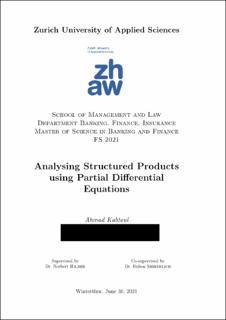Please use this identifier to cite or link to this item:
https://doi.org/10.21256/zhaw-24407Full metadata record
| DC Field | Value | Language |
|---|---|---|
| dc.contributor.advisor | Hilber, Norbert | - |
| dc.contributor.advisor | Seiberlich, Ruben | - |
| dc.contributor.author | Kabtoul, Ahmad | - |
| dc.date.accessioned | 2022-03-02T10:28:04Z | - |
| dc.date.available | 2022-03-02T10:28:04Z | - |
| dc.date.issued | 2021 | - |
| dc.identifier.uri | https://digitalcollection.zhaw.ch/handle/11475/24407 | - |
| dc.description.abstract | In this thesis, the common special features and the main assumptions of valuing and pricing Structured Products are analysed. The method reviewed uses one dimensional modelling in valuing European and American options. In order to accurately price path-dependent equity derivatives, a numerical method using finite differences partial differential equations was applied. The Black-Scholes model has been examined as well as the Constant Elasticity of Variance (CEV) model. The CEV model illustrated and was used to evaluate and price exotic options, which has been used to model and price two Structured Products: Barrier Reverse Convertibles and Capital Protected Product with Double Barrier. The three finite differences methods have been compared when valuing an European option according to accuracy for each method. Then, the best one was used for valuing American options and the CEV model for pricing Structured Products was applied. This thesis also provides important aspects for structuring a Structured Product, and is followed by the pay-off techniques that determined how the return is calculated. Then, there is a discussion about the importance of hedging and second order Greeks of Structured Products in the market. This thesis draws attention to the risks that could affect the value of the structured notes, after which is the methodology used to contribute to the sustainable development of investment products. | de_CH |
| dc.format.extent | 91 | de_CH |
| dc.language.iso | en | de_CH |
| dc.publisher | ZHAW Zürcher Hochschule für Angewandte Wissenschaften | de_CH |
| dc.rights | http://creativecommons.org/licenses/by-nc-nd/4.0/ | de_CH |
| dc.subject.ddc | 332: Finanzwirtschaft | de_CH |
| dc.title | Analysing structured products using partial differential equations | de_CH |
| dc.type | Thesis: Master | de_CH |
| dcterms.type | Text | de_CH |
| zhaw.departement | School of Management and Law | de_CH |
| zhaw.publisher.place | Winterthur | de_CH |
| dc.identifier.doi | 10.21256/zhaw-24407 | - |
| zhaw.originated.zhaw | Yes | de_CH |
| Appears in collections: | MSc Banking and Finance | |
Files in This Item:
| File | Description | Size | Format | |
|---|---|---|---|---|
| Master Thesis.pdf | 11.62 MB | Adobe PDF |  View/Open |
Show simple item record
Kabtoul, A. (2021). Analysing structured products using partial differential equations [Master’s thesis, ZHAW Zürcher Hochschule für Angewandte Wissenschaften]. https://doi.org/10.21256/zhaw-24407
Kabtoul, A. (2021) Analysing structured products using partial differential equations. Master’s thesis. ZHAW Zürcher Hochschule für Angewandte Wissenschaften. Available at: https://doi.org/10.21256/zhaw-24407.
A. Kabtoul, “Analysing structured products using partial differential equations,” Master’s thesis, ZHAW Zürcher Hochschule für Angewandte Wissenschaften, Winterthur, 2021. doi: 10.21256/zhaw-24407.
KABTOUL, Ahmad, 2021. Analysing structured products using partial differential equations. Master’s thesis. Winterthur: ZHAW Zürcher Hochschule für Angewandte Wissenschaften
Kabtoul, Ahmad. 2021. “Analysing Structured Products Using Partial Differential Equations.” Master’s thesis, Winterthur: ZHAW Zürcher Hochschule für Angewandte Wissenschaften. https://doi.org/10.21256/zhaw-24407.
Kabtoul, Ahmad. Analysing Structured Products Using Partial Differential Equations. ZHAW Zürcher Hochschule für Angewandte Wissenschaften, 2021, https://doi.org/10.21256/zhaw-24407.
Items in DSpace are protected by copyright, with all rights reserved, unless otherwise indicated.